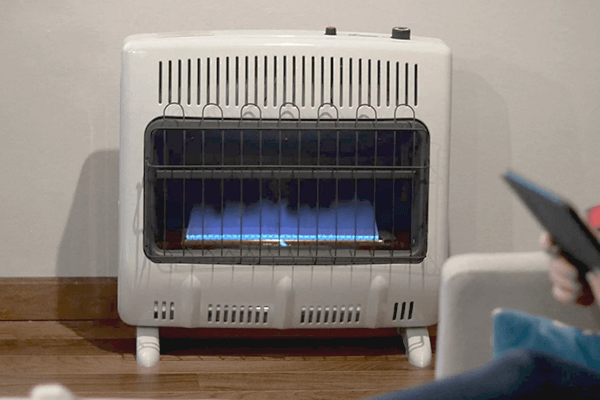No matter where you reside, propane heaters are proven to be one of the best choices for you. It can serve as a reliable alternative when the power goes, effectively function as a great supplement for a dying furnace, and efficiently keep you a little cozier during your camping adventure. Notwithstanding, they are meant to be used safely and properly.
So, can you use propane heaters indoors? In simple words, yes, propane heaters can be used indoors provided that they are used properly. To use them indoors, you must adhere to certain safety tips. With these, you will be fine. Your space should always have good airflow if the heater needs to be vented. Note that propane is flammable, so using it with a heater indoors will require extra caution.

What you’ve been missing
Water Heaters: Types, Pros Cons & More
Most Common HVAC System Problems and Solutions
When to Replace Your Furnace
Contents
Using a Propane Heater Indoors
Some propane heaters are suitable for indoor use. But typically, propane heaters are of two types, indoor and outdoor. Propane heater indoor models are made specifically for indoor use. This type offers a safe and warm experience. Propane heater outdoor models are designed to be used only outside or anywhere that’s properly ventilated and has a carbon monoxide detector. Without proper ventilation, using an outdoor propane heater can result in carbon monoxide poisoning.
Before getting a propane heater, you should double-check to know the suitable one for your needs. For instance, the way indoor and outdoor propane heaters handle smoke is very different.
So, what kind of propane heater can you use indoors? The propane heaters ideal for indoor use feature required heating capacity, reliability, and size.
- Heating Capacity: Propane Heater models are built with heating capacity (British Thermal Unit–BTU). You get better heating capacity with a higher rating.
- Reliability: Some parts of propane heaters are prone to failure for them being fuel-powered machines. To increase their service life with no failure issues, purchase the most reliable models, which usually are recognized via their build and part quality.
- Size: Compact versions are recommended if you seek smaller outputs. You can go for bigger models if you want higher output. Nevertheless, the bigger propane heater models can be heavier to transport or carry.
For the propane heater suitable for home use, you can go for wall propane heaters, which are typically vent-free. Other great propane heaters for indoor use include Dura Heat propane heater, Mr. Heater portable propane heater, Dewalt DXH12B portable propane heater, Remington indoor propane heater, and Campy Gear indoor propane heater.
Differences between Indoor & Outdoor Propane Heaters
The way indoor and outdoor propane heaters take care of smoke is the most significant difference between them. It’s medically advisable not to breathe in fumes because “Carbon Monoxide (CO)” is a particular gas that can lead to issues indoors.
Carbon monoxide poses serious health risks, and it is made by burning propane. However, it can easily be blown away when the heater is used where there are natural air currents. This makes outdoor propane heaters safer because users won’t need to do anything about Carbon Monoxide. Before building to a dangerous level, the surrounding wind will blow it away, making it innocuous.
Indoor propane heaters are a different situation. The Carbon Monoxide they produce stays because they are designed for enclosed space use. Nonetheless, the heaters feature automatic shut-off switches that help combat this problem. The switches are designed to work with the oxygen sensor– the moment the oxygen levels in the room go down, the appliance will immediately shut off to prevent the building up of CO to dangerous levels.
Moreover, some indoor propane heaters feature a carbon monoxide detector that helps read the CO in the room as a whole accurately.
Propane Heater Safety Tips
Below are the general safety tips for users of propane heaters to avoid facing a real problem.
- Install a Carbon Monoxide Detector: Ensure you install a carbon monoxide detector to monitor your CO levels effectively.
- Ventilate the Space Properly: To ensure that carbon monoxide gets out of the indoor space, you need to provide a vent by leaving a window open.
- Turn the Heater off when smells anything Strange: Although carbon monoxide is tasteless and odorless, propane is not. So, if you smell anything weird, turn the heater off immediately to stay on the safe side. Then open the window and check the system for leaks.
- Always Attend to a Propane Heater: Ensure you stay nearby the heater and keep an eye on it while it’s running.
- Purchase a Heater with a Tip-Over Safety Switch: With a Tip-Over Safety Switch on your heater, your safety against CO can be assured. The switch will help turn the heater off immediately if it’s tipped over to avoid being at risk of a fire.
- Run the Heater Only When Needed: To keep the propane heater safe, ensure you use it only when it’s needed to prevent it from wearing and tearing down. You can allow CO to dissipate, give the heater a break, and save propane by turning the heater off every few hours when warming the space.
- Check Regularly for Leaks: The durability of your heater will depend on how you take care of it. Maintain your propane heater by keeping it dust-free and clean. Also, check the heater for leaks from time to time by looking for faulty seals, cracks, or any escape route for gas. Ensure you replace, patch, or get a professional technician to repair it if you discover that it’s leaking.
- Properly Move and Store the Heater: Ensure you take good care of the heater when it’s not in use. For most heaters, you’re only meant to store and move them while upright. Storing them sideways or tipping them over can affect the internal connections. Besides, ensure you disconnect the tube or fuel sources when the heater is not used to reduce the risk of any leaks.
Frequently Asked Questions (FAQs)
Check below some of the frequently asked questions about using a propane heater indoors. Please, review them with their answers for further knowledge.
How Much Ventilation Do You Need for a Propane Heater?
Enough fresh air is the standard amount of ventilation for a propane heater. To prevent the heater from expending air in the space and replacing it with CO, you need to provide fresh air openings. This is when you have a heated space of 2,800 sq. cm (3 square feet) for every 100,00 BTU/Hr of heater output.
Is it safe to sleep with a propane heater?
For a vent-free propane space heater, you can put yourself at risk of carbon monoxide poisoning if used while you’re asleep. You may breathe in harmful and even deadly amounts of carbon monoxide when sleeping before the CO detector switches off. This is because CO is odorless.
Wrapping Up
Typical propane heaters include indoor propane heaters and outdoor propane heaters. Indoor propane heaters are designed to be used within an enclosed space. So, if you seek propane heaters that you can use indoors, then go for the indoor models. But it’s professionally advisable that you follow all the safety instructions to avoid facing several issues while using them.
